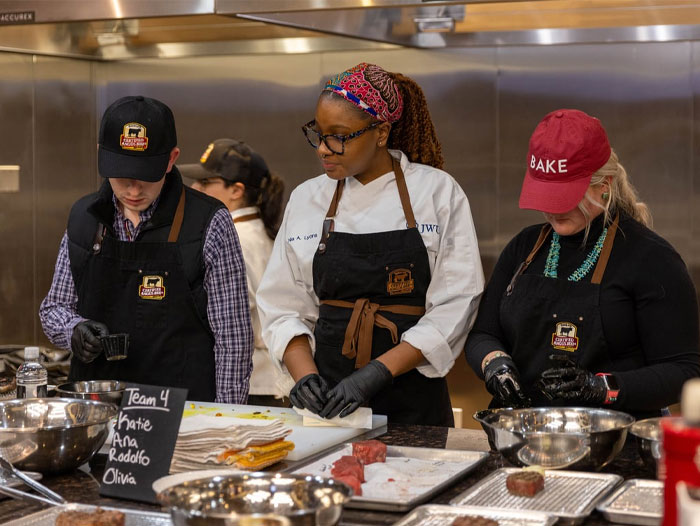Chef Coats and Cowboy Hats: Connecting the Culinarian and Rancher Event
January 24, 2025 | 4 min to read
Certified Angus Beef's Connecting the Culinarian and Rancher event brought together culinary students from Johnson & Wales University and ranchers to explore beef production through hands-on experiences and storytelling. Participants learned about sustainability and the vital connection between ranching and culinary arts, fostering mutual respect and understanding. The event concluded with collaborative cooking, uniting skills and honoring the source of ingredients. Ultimately, it built a community focused on quality and meaningful culinary experiences within the beef industry.

Certified Angus Beef brings culinary and ranching students together for the Connecting the Culinarian and Rancher event.
Certified Angus Beef’s Connecting the Culinarian and Rancher event united culinary students and ranchers to explore the entire journey of beef production. Through hands-on experiences, storytelling and collaboration, participants gained a deeper appreciation for each other’s craft, leaving this event with lasting connections and a shared vision for the future of beef.
Boots crunch in snowy pastures. Aprons tied tight in the kitchen. And conversations of beef fill the air. Bringing together the next generation of cattlemen and women and chefs, the Certified Angus Beef (CAB) Connecting the Culinarian and Rancher event fosters a deep connection between opposite ends of the beef supply chain.
Two worlds collide, with one focused on raising the best beef and the other crafting dishes that honor it. This innovative program unites students from Johnson & Wales University (JWU) and ranchers from across the United States, offering an immersive look at the beef industry.
The event emphasizes collaboration, storytelling, and a shared commitment to sustainability. By engaging the next generation of culinary and beef professionals, CAB builds a unified community based on mutual respect and a common purpose for the future of beef.
Behind the Boots and Aprons
Participants began in the meat lab exploring beef fabrication. There, they discovered the cuts that often go overlooked but can be just as flavorful as a ribeye or filet mignon.
Chef Vinnie Cimino, operating partner and executive chef at Cordelia, joined the group to share his perspective on the intersection of food and storytelling.
“It’s our duty to appreciate the things farmers and ranchers do,” he said. “Without them, we wouldn’t have the great beef we serve today.”
Through Chef Cimino’s guidance, students learned how to carry the story of the ranch into their dishes, elevating their culinary creations by honoring the source of their ingredients. It was here that a mutual appreciation began to form between ranchers and chefs, each gaining a deeper understanding of the other’s craft.
Sustainability and Shared Purpose
The group then traveled to a local Angus farm. There, culinary students learned from the family raising purebred Angus seedstock what it takes to meet customer demand. They shared sustainable practices and the ranchers’ commitment to animal and environmental stewardship. For many culinary students, including JWU sophomore Caleb Brown, this was their first in-depth look at how ranchers care for their land, cattle and resources.
“Seeing the connection between ranchers and their land really opened my eyes,” Brownsaid. “It’s not just about raising cattle; it’s about ensuring we care for the environment and the animals so future generations can continue the tradition.”
Katie Scheiv, also a student at JWU, relayed a similar perspective.
“I previously thought most ranching was always on large-scale operations, but now I understand the process spans a longer timeline,” she said. “Through conversations with ranching students, I realized it’s not just a job, but a lifestyle.”
The event concluded with a collaborative cooking session, where attendees worked together to prepare a shared meal using the cuts they explored earlier. The process brought their respective skills to life, blending culinary artistry with a profound respect for the work that begins on the ranch.
Building Communities for the Future
“It’s amazing how similar ranchers and chefs really are,” said Olivia Rooker, agricultural communications student at Oklahoma State University. “We both put in the hours, take pride in our work, and share the goal of creating something meaningful for others to enjoy.”
At its core, the event was about relationships. By sharing meals, stories and experiences, participants found common values: hard work, long hours and commitment to quality.
Through programs like Connecting the Culinarian and Rancher, CAB is building bridges between cattle ranchers and chefs who create memorable beef dishes.
“I never thought I would get an opportunity to engage in an experience like this,” Rooker said. “The knowledge I’ve gained has fueled my fire and passion for working in the agricultural industry and to share my story with others to do the same thing.”
Together, they are shaping a stronger, more connected beef community.
